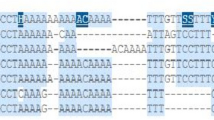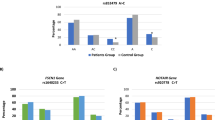Abstract
The Arg188His polymorphism in the XRCC2 gene has been suggested as a risk factor for cancer with inconclusive results. The aim of the current study is to investigate the association between the polymorphism with of cancer by meta-analysis. A total of 33 case–control studies from 27 publications were included for data analyses. The results suggested that the Arg188His polymorphism was not associated with increased/decreased risk of cancer in total analysis (Arg/His+His/His vs. Arg/Arg: OR = 0.98, 95 % CI = 0.91–1.06). In the subgroup analysis by ethnicity, no statistical significant association was found in Europeans. In the subgroup analysis by cancer types, statistical significant association was found in ovarian cancer but not in other cancers. The current meta-analysis indicated that the Arg188His polymorphism in the XRCC2 gene might be a risk factor for ovarian cancer. In the future, more large-scale case–control studies are needed to validate our results.




Similar content being viewed by others
References
Kuschel B, Auranen A, McBride S, Novik KL, Antoniou A, Lipscombe JM, et al. Variants in DNA double-strand break repair genes and breast cancer susceptibility. Hum Mol Genet. 2002;11(12):1399–407.
Curtin K, Lin WY, George R, Katory M, Shorto J, Cannon-Albright LA, et al. Genetic variants in XRCC2: new insights into colorectal cancer tumorigenesis. Cancer Epidemiol Biomark Prev. 2009;18(9):2476–84. doi:10.1158/1055-9965.EPI-09-0187.
Garcia-Closas M, Egan KM, Newcomb PA, Brinton LA, Titus-Ernstoff L, Chanock S, et al. Polymorphisms in DNA double-strand break repair genes and risk of breast cancer: two population-based studies in USA and Poland, and meta-analyses. Hum Genet. 2006;119(4):376–88. doi:10.1007/s00439-006-0135-z.
Siegel R, Naishadham D, Jemal A. Cancer statistics, 2013. CA Cancer J Clin. 2013;63(1):11–30. doi:10.3322/caac.21166.
Benhamou S, Tuimala J, Bouchardy C, Dayer P, Sarasin A, Hirvonen A. DNA repair gene XRCC2 and XRCC3 polymorphisms and susceptibility to cancers of the upper aerodigestive tract. Int J Cancer J int Cancer. 2004;112(5):901–4. doi:10.1002/ijc.20474.
Park DJ, Lesueur F, Nguyen-Dumont T, Pertesi M, Odefrey F, Hammet F, et al. Rare mutations in XRCC2 increase the risk of breast cancer. Am J Hum Genet. 2012;90(4):734–9. doi:10.1016/j.ajhg.2012.02.027.
Perez LO, Crivaro A, Barbisan G, Poleri L, Golijow CD. XRCC2 R188H (rs3218536), XRCC3 T241M (rs861539) and R243H (rs77381814) single nucleotide polymorphisms in cervical cancer risk. Pathol Oncol Res. 2013;19(3):553–8. doi:10.1007/s12253-013-9616-2.
Pooley KA, Baynes C, Driver KE, Tyrer J, Azzato EM, Pharoah PD, et al. Common single-nucleotide polymorphisms in DNA double-strand break repair genes and breast cancer risk. Cancer Epidemiol Biomark Prev. 2008;17(12):3482–9. doi:10.1158/1055-9965.EPI-08-0594.
Han J, Hankinson SE, Ranu H, De Vivo I, Hunter DJ. Polymorphisms in DNA double-strand break repair genes and breast cancer risk in the Nurses’ Health Study. Carcinogenesis. 2004;25(2):189–95. doi:10.1093/carcin/bgh002.
Krupa R, Sliwinski T, Wisniewska-Jarosinska M, Chojnacki J, Wasylecka M, Dziki L, et al. Polymorphisms in RAD51, XRCC2 and XRCC3 genes of the homologous recombination repair in colorectal cancer—a case control study. Mol Biol Rep. 2011;38(4):2849–54. doi:10.1007/s11033-010-0430-6.
Matullo G, Guarrera S, Sacerdote C, Polidoro S, Davico L, Gamberini S, et al. Polymorphisms/haplotypes in DNA repair genes and smoking: a bladder cancer case–control study. Cancer Epidemiol Biomark Prev. 2005;14(11 Pt 1):2569–78. doi:10.1158/1055-9965.EPI-05-0189.
Zhang Y, He J, Deng Y, Zhang J, Li X, Xiang Z, et al. The insertion/deletion (I/D) polymorphism in the angiotensin-converting enzyme gene and cancer risk: a meta-analysis. BMC Med Genet. 2011;12:159. doi:10.1186/1471-2350-12-159.
Auranen A, Song H, Waterfall C, Dicioccio RA, Kuschel B, Kjaer SK, et al. Polymorphisms in DNA repair genes and epithelial ovarian cancer risk. Int J Cancer J Int Cancer. 2005;117(4):611–8. doi:10.1002/ijc.21047.
Beesley J, Jordan SJ, Spurdle AB, Song H, Ramus SJ, Kjaer SK, et al. Association between single-nucleotide polymorphisms in hormone metabolism and DNA repair genes and epithelial ovarian cancer: results from two Australian studies and an additional validation set. Cancer Epidemiol Biomark Prev. 2007;16(12):2557–65. doi:10.1158/1055-9965.EPI-07-0542.
Millikan RC, Player JS, Decotret AR, Tse CK, Keku T. Polymorphisms in DNA repair genes, medical exposure to ionizing radiation, and breast cancer risk. Cancer Epidemiol Biomark Prev. 2005;14(10):2326–34. doi:10.1158/1055-9965.EPI-05-0186.
Webb PM, Hopper JL, Newman B, Chen X, Kelemen L, Giles GG, et al. Double-strand break repair gene polymorphisms and risk of breast or ovarian cancer. Cancer Epidemiol Biomark Prev. 2005;14(2):319–23. doi:10.1158/1055-9965.EPI-04-0335.
Bastos HN, Antao MR, Silva SN, Azevedo AP, Manita I, Teixeira V, et al. Association of polymorphisms in genes of the homologous recombination DNA repair pathway and thyroid cancer risk. Thyroid. 2009;19(10):1067–75. doi:10.1089/thy.2009.0099.
Brooks J, Shore RE, Zeleniuch-Jacquotte A, Currie D, Afanasyeva Y, Koenig KL, et al. Polymorphisms in RAD51, XRCC2, and XRCC3 are not related to breast cancer risk. Cancer Epidemiol Biomark Prev. 2008;17(4):1016–9. doi:10.1158/1055-9965.EPI-08-0065.
Fayaz S, Fard-Esfahani P, Fard-Esfahani A, Mostafavi E, Meshkani R, Mirmiranpour H, et al. Assessment of genetic mutations in the XRCC2 coding region by high resolution melting curve analysis and the risk of differentiated thyroid carcinoma in Iran. Genet Mol Biol. 2012;35(1):32–7.
Figueroa JD, Malats N, Rothman N, Real FX, Silverman D, Kogevinas M, et al. Evaluation of genetic variation in the double-strand break repair pathway and bladder cancer risk. Carcinogenesis. 2007;28(8):1788–93. doi:10.1093/carcin/bgm132.
Garcia-Quispes WA, Perez-Machado G, Akdi A, Pastor S, Galofre P, Biarnes F, et al. Association studies of OGG1, XRCC1, XRCC2 and XRCC3 polymorphisms with differentiated thyroid cancer. Mutat Res. 2011;709–710:67–72. doi:10.1016/j.mrfmmm.2011.03.003.
Han J, Colditz GA, Samson LD, Hunter DJ. Polymorphisms in DNA double-strand break repair genes and skin cancer risk. Cancer Res. 2004;64(9):3009–13.
Han J, Hankinson SE, Hunter DJ, De Vivo I. Genetic variations in XRCC2 and XRCC3 are not associated with endometrial cancer risk. Cancer Epidemiol Biomark Prev. 2004;13(2):330–1.
Jiao L, Hassan MM, Bondy ML, Wolff RA, Evans DB, Abbruzzese JL, et al. XRCC2 and XRCC3 gene polymorphism and risk of pancreatic cancer. Am J Gastroenterol. 2008;103(2):360–7. doi:10.1111/j.1572-0241.2007.01615.x.
Rafii S, O’Regan P, Xinarianos G, Azmy I, Stephenson T, Reed M, et al. A potential role for the XRCC2 R188H polymorphic site in DNA-damage repair and breast cancer. Hum Mol Genet. 2002;11(12):1433–8.
Rajaraman P, Hutchinson A, Wichner S, Black PM, Fine HA, Loeffler JS, et al. DNA repair gene polymorphisms and risk of adult meningioma, glioma, and acoustic neuroma. Neuro Oncol. 2010;12(1):37–48.
Romanowicz-Makowska H, Smolarz B, Gajecka M, Kiwerska K, Rydzanicz M, Kaczmarczyk D, et al. Polymorphism of the DNA repair genes RAD51 and XRCC2 in smoking- and drinking-related laryngeal cancer in a Polish population. Arch Med Sci. 2012;8(6):1065–75. doi:10.5114/aoms.2012.32417.
Romanowicz-Makowska H, Smolarz B, Zadrozny M, Westfal B, Baszczynski J, Polac I, et al. Single nucleotide polymorphisms in the homologous recombination repair genes and breast cancer risk in Polish women. Tohoku J Exp Med. 2011;224(3):201–8.
Zienolddiny S, Campa D, Lind H, Ryberg D, Skaug V, Stangeland L, et al. Polymorphisms of DNA repair genes and risk of non-small cell lung cancer. Carcinogenesis. 2006;27(3):560–7. doi:10.1093/carcin/bgi232.
Romanowicz H, Smolarz B, Baszczynski J, Zadrozny M, Kulig A. Genetics polymorphism in DNA repair genes by base excision repair pathway (XRCC1) and homologous recombination (XRCC2 and RAD51) and the risk of breast carcinoma in the Polish population. Pol J Pathol. 2010;61(4):206–12.
Romanowicz-Makowska H, Smolarz B, Zadrozny M, Westfa B, Baszczynski J, Kokolaszwili G, et al. The association between polymorphisms of the RAD51-G135C, XRCC2-Arg188His and XRCC3-Thr241Met genes and clinico-pathologic features in breast cancer in Poland. Eur J Gynaecol Oncol. 2012;33(2):145–50.
Author information
Authors and Affiliations
Corresponding author
Rights and permissions
About this article
Cite this article
Zhang, Y., Wang, H., Peng, Y. et al. The Arg188His polymorphism in the XRCC2 gene and the risk of cancer. Tumor Biol. 35, 3541–3549 (2014). https://doi.org/10.1007/s13277-013-1468-6
Received:
Accepted:
Published:
Issue Date:
DOI: https://doi.org/10.1007/s13277-013-1468-6




